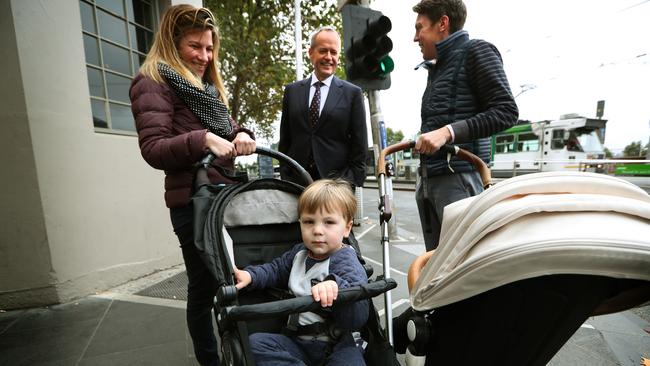Wages plan to open floodgates for union claims: business
Labor’s plan to subsidise a 20pc pay rise for childcare workers has been criticised by business.

Business and industry groups are warning Bill Shorten that his plan to directly fund a 20 per cent wage rise for childcare workers will trigger more union claims for pay rises to be financed from government revenues and higher taxes.
Leading business figures and economists suggested the move represented an undermining by Labor of Australia’s industrial relations structure and a challenge to the role of the independent Fair Work Commission, which last year rejected a long-running union equal-pay claim for childcare workers.
The Opposition Leader yesterday moved to seize back control of the policy agenda after stumbles in the first two weeks of the campaign, unveiling a $4 billion package to increase childcare subsidies for families and a $2.4bn shake-up to give free dental care to pensioners.
Business sounded the alarm on his plan to bolster the wages of childcare workers through a direct government payment, with Mr Shorten vowing that Labor would increase the average wage in the sector by $11,300 on top of the award rate in the next eight years.
Labor yesterday committed $537 million over four years to achieving the goal.
“This is an investment in pay equity for a female-dominated industry — a fair reward for a workforce that has about 96 per cent women, has been undervalued and underpaid for too long,” Mr Shorten told an ALP campaign rally in Box Hill, Melbourne.
Australian Industry Group chief executive Innes Willox challenged Labor over the move, saying the proposal was out of step with the setting of workers’ wages under Australia’s industrial relations framework.
“The wages of childcare workers are paid by their employers, not by the government,” Mr Willox said. “The wages in the children’s services award are set by the independent Fair Work Commission, and the wages in enterprise agreements are negotiated between employers and employees.
“How would unions or workers in other sectors be stopped making claims against taxpayers and employers for a similar 20 per cent wage increase?”
Australian Chamber of Commerce and Industry chief James Pearson asked how Labor would “respond to longstanding union demands for wage increases in other industries”.
“It is important for Labor to clarify how its pledge to use taxpayers’ money to fund a 20 per cent wage rise over eight years leaves the ongoing Fair Work Commission process,” he said.
Education Minister Dan Tehan warned the proposal would have negative consequences for enterprise bargaining and wage negotiations.
“Why would any boss give a pay rise to a worker if they know the taxpayer will fund any increase?” he said.
Union leaders yesterday sought to allay business concerns by denying the announcement set a precedent to pursue taxpayer-funded pay rises in other female-dominated low-paid sectors.
United Voice assistant national secretary Helen Gibbons said the “historic professional pay win” reflected the unique circumstances facing early education workers and that the union would not seek similar arrangements in sectors such as aged care.
“I would not want people to think this is setting a precedent and we are going to do this everywhere,’’ she said.
“The reason early educators’ wages were kept low was because either parents’ fees go up or the funding goes up. The funding hadn’t gone up and no one wanted to put the parents’ fees up so they were just squashed between a rock and a hard place.”
ACTU president Michele O’Neil said the funding for early childhood educators “addresses specific issues in that sector”.
Senior ALP figures told The Australian the funding for early childhood pay rises was a priority, and indicated the merits of pay rises for workers in other female-dominated industries would be dealt with through beefed-up gender equity provisions promised by Labor.
If Mr Shorten wins office, Labor has committed to strengthening the ability of the Fair Work Commission to order pay rises for workers in female-dominated industries.
A Labor government would change the Fair Work Act to make it clear the commission must consider pay equity a central objective of the workplace relations system.
The commission would get extra funding to conduct pay equity reviews overseen by a new presidential member and supported by an expert pay equity panel.
Labor’s spokeswoman for early childhood education, Amanda Rishworth, said Labor would also task the competition watchdog with investigating “excessive fee increases and unscrupulous providers” in the childcare sector. In relation to the 20 per cent rise in early childhood worker pay, she said discussion was needed to “ensure every cent goes to early educator pay, and that parents don’t see any increase in fees as a result of the pay rise”.
Grattan Institute chief executive John Daley said yesterday he could think of no comparable example where the government had directly funded a pay increase for private sector workers. “You can certainly see it creating precedents for the NDIS and disability carers,” he said. “The other sector where this could potentially apply would be aged care.”
Robert Carling, a senior fellow at the Centre for Independent Studies, said a 20 per cent increase in pay was “huge” and would set a precedent for other sectors heavily subsidised or directly funded by government, such as nursing.
Under Mr Shorten’s $4bn plan to increase childcare subsidies, families earning up to $69,527 would get free childcare, while families earning between $69,528 and $100,000 will get tapered subsides of between 100 per cent and 85 per cent. The subsidy tapers to 60 per cent for families earning up to $174,527.



To join the conversation, please log in. Don't have an account? Register
Join the conversation, you are commenting as Logout